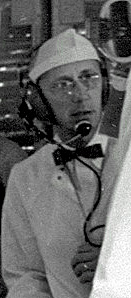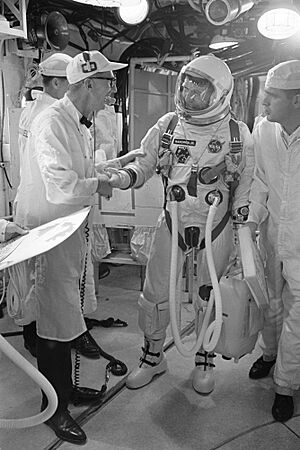Günter Wendt facts for kids
Quick facts for kids
Guenter Wendt
|
|
|---|---|

Wendt in the Friendship 7 white room
|
|
| Born |
Günter F. Wendt
August 28, 1923 |
| Died | May 3, 2010 (aged 86) Merritt Island, Florida, U.S.
|
| Nationality | German |
| Citizenship | United States |
| Occupation | Engineer |
| Engineering career | |
| Discipline | Mechanical engineering |
| Practice name | Launch pad leader |
| Employer(s) | McDonnell Aircraft, North American Rockwell |
| Projects | Mercury, Gemini, Apollo, Skylab |
Günter F. Wendt (born August 28, 1923 – died May 3, 2010) was a German-born American engineer. He was well-known for his work in the United States' program to send people into space. He worked for McDonnell Aircraft and later North American Aviation.
Wendt was in charge of the teams that prepared spacecraft for launch. These teams worked at the launch pads for all the Mercury and Gemini programs (1961–1966). He also worked on the crewed parts of the Apollo, Skylab, and Apollo–Soyuz programs (1968–1975). These launches happened at the Kennedy Space Center (KSC). His official job title was Pad Leader.
In NASA videos, Wendt often appeared as a thin man wearing glasses, a bow-tie, and a white coat and cap. He was usually standing near the spacecraft's hatch with a clipboard. Sometimes, he would be bending over astronauts, helping them get their safety harnesses tight before launch.
Contents
Biography
Early Life and Moving to the U.S.
Günter Wendt was born in Berlin, Germany. He studied mechanical engineering, which is about designing and building machines. During World War II, he worked as an engineer on planes for Germany. He also spent four years learning how to build aircraft.
After the war ended, there were not many jobs for engineers in Germany. So, in 1949, Wendt decided to move to the United States. He joined his father in St. Louis, Missouri. A company called McDonnell Aircraft, which made things for the military, wanted to hire him. However, they could not hire a German citizen at that time.
Wendt found a job as a truck mechanic, even though he had never worked on trucks before. Within a year, he became the supervisor of the shop. He became a U.S. citizen in 1955. Soon after, McDonnell Aircraft hired him as an engineer.
Working at McDonnell Aircraft

As an engineer at McDonnell, Wendt oversaw the preparations for spacecraft launches. This work took place at Cape Canaveral. He started with the Mercury and Gemini space programs, beginning with the flight of Ham the chimpanzee in 1961.
Astronauts began to see him as a good luck charm. He was always the last friendly face they saw before leaving Earth. He would joke with them and wish them a good flight. He also made sure all the final steps to prepare the spacecraft were completed just before launch.
Wendt had the final say for the "white room" team at the launch tower. This team was responsible for helping the astronauts get into the spacecraft and securing them. They also made sure all the spacecraft's instruments, switches, and controls were correct for launch. No one touched anything without his permission.
Wendt once said, "There is no reason to say I am narrow-minded. Just do it my way and you will have no problem at all."
Astronaut Pete Conrad, who was known for his humor, once said about Wendt: "It's easy to get along with Guenter. All you have to do is agree with him."
Mercury astronaut John Glenn playfully called Wendt "der Führer of der Launch Pad." This nickname came from Wendt's German accent and his organized, strict, but good-humored way of leading his team. Astronauts respected his careful approach to setting up equipment and his strong focus on safety.
Before Glenn's Mercury flight, Wendt tried to comfort Glenn's wife, Annie. He told her, "We cannot guarantee you safe return of John. This would be lying. Nobody can guarantee you this – there is too much machinery involved. The one thing I can guarantee you is that when the spacecraft leaves it is in the best possible condition for a launch." He added that if anything went wrong, he wanted to be able to look her in the eye and say, "We did the best we could."
In January 1967, Wendt was still with McDonnell. He was not involved with the Apollo 1 spacecraft. A fire happened inside that spacecraft, which sadly killed astronauts Gus Grissom, Ed White, and Roger Chaffee. After the accident, some people wished he had been there, thinking he might have found the problem. But Wendt himself did not believe this.
Working at North American Rockwell
Wally Schirra, an experienced astronaut from Mercury and Gemini, was chosen for the Apollo 7 flight. He strongly wanted Wendt to be in charge of the pad crew again. Schirra convinced Deke Slayton, the chief astronaut, to get North American Aviation to hire Wendt. Schirra even personally convinced a vice-president at North American to change Wendt's work shift. This way, Wendt could be the pad leader for Apollo 7.
During the Apollo 7 launch, astronaut Donn Eisele joked to the ground crew, "I vonder vere Guenter Vendt." This was a playful way of saying "I wonder where Guenter Wendt" with a German accent.
Astronauts on other Apollo missions also thought highly of Wendt. He continued as Pad Leader through the Skylab and Apollo–Soyuz missions. He kept working at KSC until he retired in 1989, even helping with the early Space Shuttle flights.
Later Years
Wendt's wife, Herma, passed away in 1993. They had been married for over 40 years.
Later in his life, Wendt worked as a helper for several TV shows and movies about the U.S. space program. He also wrote his autobiography, The Unbroken Chain, in 2001 with Russell Still. He remained good friends with many of the early astronauts.
Guenter Wendt passed away on May 3, 2010, at his home in Merritt Island, Florida. He had been dealing with health problems. He is survived by his three daughters, five grandchildren, a great-grandson, and a great-great-grandson.
Awards and Honors
Wendt received several awards from NASA. These include the Letter of Appreciation award, the Silver Snoopy award, and several Group Achievement awards. He was given a NASA Lifetime Achievement Award in 2009.
An asteroid, 429033 Günterwendt, was named in his honor. It was discovered in 2009 by a German astronomer named Felix Hormuth.
On Film and Television
Wendt has been shown in several movies and TV shows about the U.S. space program:
- Apollo 13 (1995): He was played by Endre Hules. In the movie, astronaut Jim Lovell (played by Tom Hanks) jokes with Wendt in a German accent. He also repeats the line "I vonder vere Guenter Vendt" from Apollo 7.
- From the Earth to the Moon (1998): He was played by Max Wright. Wendt also appeared as an unnamed engineer in one episode.
- In Search of Liberty Bell 7 (1999): This was a Discovery Channel documentary. Wendt took part in the trip to bring up Gus Grissom's sunken Mercury capsule.
- First Man (2018): He was played by Steve Coulter.
Wendt also appears in the 1998 documentary One Giant Leap.


